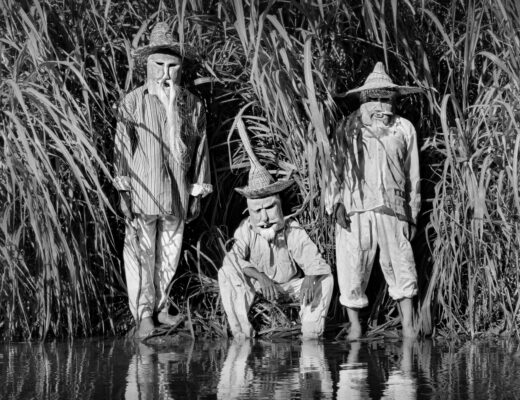This year’s Prismatic Ground features a pair of films that share several procedures and concerns. Janaína Nagata’s Private Footage uses the discovery of a home movie from South Africa to illuminate some seldom-explored aspects of the history of Apartheid. Likewise, Declan Clarke’s What Are the Wild Waves Saying? zeroes in on a small corner of Irish literary history in order to elucidate unexpected links between Ireland, the IRA, and Nazi Germany. The film focuses on the role of Francis Stuart, played by Clarke himself in a series of stark, ascetic reenactments. Stuart was an Irish nationalist who conducted radio broadcasts for the Nazis between 1940 and 1944. Stuart, like a number of Irish radicals and IRA supporters, thought that by supporting the Axis powers, they were helping to destabilize their enemies in Great Britain, a classic case of “the enemy of my enemy is my friend.”
As Wild Waves articulates, the unique power of radio to traverse physical distance permitted Stuart and other political dissidents across the spectrum — fascist to Bolshevik — to reconfigure their idea of a homeland, seeing in Hitler’s pan-European fanaticism a chance to identify against the English and with a new order, one in which they could be equal partners. Of course, some of these men were Irish fascists who hoped the Third Reich would dismantle the decadent democracies of the UK and the U.S. Others were little more than opportunists.
Clarke is an extreme formalist. His reenactments are spare and stilted, all characterized by the deliberate choice to exclude the human voice from an otherwise sync-soundtrack. With its fixed camera and blocky compositions, Wild Waves recalls certain post-Straubian filmmakers such as Ricky D’Ambrose and especially Ted Fendt. By the end of the film, as Clarke slowly tours the gravesites of these traitorous men, John Gianvito’s Profit Motive and the Whispering Wind also may come to mind — another film that examines the historical meaning etched into given landscapes. Having said all that, there is a lugubrious, at times stifling quality to Clarke’s film, as if the director was determined to counteract the basic elements of cinema, such as rhythm and movement. Clarke’s project is compelling, but he may not have yet located the best formal strategies through which to realize it. Still, Wild Waves is a nice introduction to the director, and it will be interesting to see where he goes next.
Published as part of InRO Weekly — Volume 1, Issue 18.







